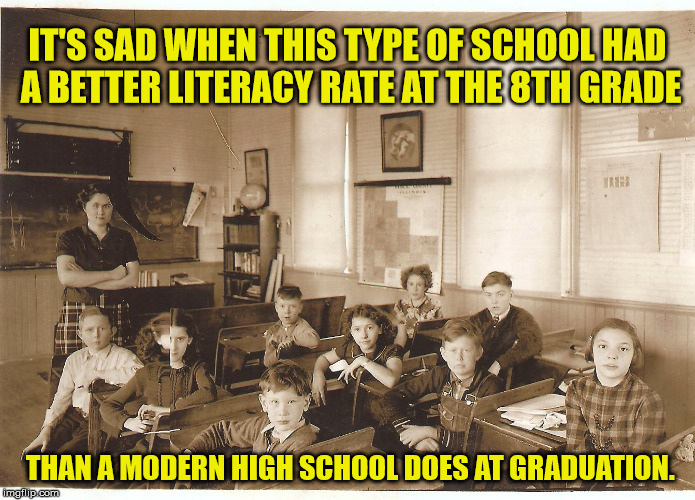"Get involved and spend some time with your children"

Posted on 07/28/2018 5:06:38 PM PDT by BruceDeitrickPrice
Subtitle: Fix reading and half of our education problems disappear
--It's a common problem in the US. Children in the second and third grades, even the fourth and fifth grades, are struggling readers. They guess; they skip ahead; they search for clues from context; they look at pictures to read words. Did I mention they guess? Typically, these children are unsuccessful in most school subjects and very unhappy.
The school may think this slow progress is fine. But perhaps you as a parent know younger children who've already learned to read. You worry that your child Is falling behind. You are right to worry.
The first thing to confront is that teachers and school officials will mislead you. Truth is, they'll lie: "Your child is doing fine. He's getting plenty of phonics." But then your child comes home with a list of sight-words to be memorized. You know phonics is being slighted. But what can you do?
Here's a second problem: finding help is not easy. The media are basically a dead zone. You're not going to find advice on reading in your local newspaper or TV program.
Bottom line, sight-word instruction (that is, learning to name word-designs on sight) is the cause of most reading problems. Ideally, schools stop using them. The good news is that a list of sight-words can be a valuable wake-up call. They tell you that the school has embraced the destructive ideas which have been hurting children for the past 80 years.
Parents should trust systematic phonics where the focus is on learning letters, then the sounds represented by the letters, then the blends of those sounds. (Usually the whole process takes five months. All phonics experts say the same thing: reading is easy.)
So let's say your child is having reading problems; and simultaneously your child brings home lists of sight-words to memorize. Get involved immediately and teach your child the basics of phonics. Namely, letters represent sounds.
To start, parents can read "Preemptive Reading," a quick introduction to phonics. (It includes a list of complete phonics courses.)
YouTube has many helpful videos. A. J. Jenkins in Australia has made some wonderful phonics videos. One of these has attracted more than half-a-billion views! Encourage your child to sing along. Very quickly he'll have the phonics idea in his head.
The main thing is that children get the concept that letters and words are symbols for SOUNDS. When looking at b-words like beach, branch, ball, and block, the child knows that all of them start with the same sound. At that point, language becomes logical and predictable.
Sight-words, on the other hand, are always arbitrary, like a phone number you just committed to memory. (Wait a minute, was that 5271 or 5721?)
Despite all the propaganda we hear, the English language is 100% phonetic. There is no such thing as a non-phonetic word in an English dictionary. Indeed, all the words are arranged alphabetically, which is to say that all the words listed under B start with the same b-sound.
English is an old language that has borrowed many foreign words. So our vowels can be inconsistent. But old tennis shoes are still tennis shoes. Whole Word promoters try to pretend that a small difference means that something is "non-phonetic." No, merely non-consistent. For a word to be truly non-phonetic, it would have to be something like XXFG, which you're told to pronounce "shuffleboard." Fortunately, English has no such words, although the Education Establishment loves to pretend otherwise.
Some children learn to read almost without instruction. The brain figures out the easy way to read, which is to identify the phonics information. Less verbal children seem to need more rules and more practice. But keep in mind that phonics rules are stepping stones to reading, not goals in themselves. Don't hesitate to teach something over and over; on the other hand don't hesitate to move along. It's good to make the learning process as fun as possible. Mix in singing, poetry, knock-knock jokes, and football cheers.
The most important thing of all is helping children find things they want to read. Once reading is easy for children, they'll read everything in sight. The problem in our schools now is that many children never reach that point. Especially make sure that boys find material that is appealing to boys.
Sight-words (also known by many other names) are probably viewed by our far-left as one of the most successful subversive tricks in history. They imposed this incorrect theory on the public schools in 1931. They carefully destroyed phonics books, and since that time they have been conducting a rearguard operation insisting that sight-words are terrific, phonics doesn't work, and kids will read when they are ready. If they don't read, that's because they have a serious problem like dyslexia. Nature caused this problem, so our Education Establishment can claim to be blameless for what it has perpetrated! Phonics experts reject the sophistry, saying that "dyslexia" should be relabeled "dysteachia." That is, a disease caused by classroom instruction.
The simple way to save American K-12 is to eliminate sight-words and return to phonics. Children must learn to read before they can read to learn.
Facts:
1. Only the parents can make a difference. Only the parents love their child. Do not rely on the schools.
2. Micromanage like heck. Know your kids abilities or lack of and work to help them. Tutors, one on ones with the teachers, (parent/teacher) etc.
3. Boys and girls learn to read and write differently. Girls learn to read and write faster than boys. Something that seems to be unknown to educators.
The public school system looks at your kids as little guinea pigs. They will experiment on them like lab mice with this goofy program and that. You have to be smart and know what is useful and what is a waste of time and fill in the gaps when important time is lost.
The key really is that each letter has a sound. I have taught children and adults to read using phonics and sounding out words.
The only issue I had teaching adults to read is there are few books that are not for small children. I taught adults to sound out words in a grocery list and wrote things myself for them to read until they could read well enough for adult material.
Good luck and don’t give up!! I have felt defeated trying to teach someone to read and all the sudden the light bulb goes on. When that light bulb goes on with letter sounds they will learn to read super fast.
yup
I could read pretty well by the time I was in the second grade. This would have been around 1953.
I would often read signs as we drove. Having learned to sound out words, I would sometimes make some pretty bad pronunciations. My parents and siblings thought it was funny.
No, that’s not it. What else should they do, and don’t say get involved and spend some time. /s
“”My kid can’t read. What should I do?”
One should have asked that question before birthing a child with bad genes.
Use the Explode the Code phonics system. Taught both my children to read by age five.
Get a copy of Teach your Child to Read in 100 Easy Lessons by Siegfried Englemann. It’s scripted for the teacher. Each lesson is about 16 minutes. He’ll be reading in no time.
“See Spot run! Run Spot run!”
Congratulations! Well done! Parents could learn from your example. :-)
I blame sight-word teaching for a common error I see, even on this forum.
People use the word “defiantly” when the correct term is “definitely.”
(Argh)

thanks Tammy, I won’t give up. We work with phonics and long vowel books right now and then we’re reading Hunger Games together. Sometimes I read to him, sometimes I have him read and to keep the flow I pronounce the words immediately that are too big for him. Just gets him familiar with reading and hearing a story.
I do feel that once they find something interesting to read it helps alot.
I know it’s insane, but how about cutting the TV. Throw it away. The internet? GONE. Take them to the library and when books are their only entertainment, you will find them devouring books.
 and you dint teach him before because? what are you, illiterate or stooopid???
and you dint teach him before because? what are you, illiterate or stooopid???

Beautiful opportunity for the church. Of course, we’ll screw it up and won’t do anything.
Good to see a fellow Catholic here
Genuine question: Why are these two approaches defined as being mutually exclusive? Given the oddness of much English pronunciation,it seems to me that both are necessary even if phonics provides initial building blocks and instills the notion of generalized rule formulation a la Chomsky. Idiographic languages clearly limit a phonics approach - and Chinese, Korean and Japanese students seem to manage quite well.
You’re probably the one who puts this up every year. And I usually do the same thing, say that you are half right. But many kids and newly literate adults do memorize the visuals of words and make connections with their brains that way. Two of my kids have cracked the code of reading, early, with zero phonics. One other child is already recognizing familiar words.
Phonics works better in other languages than English. It’s still important but it’s not 100% of actual learning to read. It’s more work than connecting the visual patterns of letters and words to meanings, which is instinctive and thus easy to the plastic child brain.
Disclaimer: Opinions posted on Free Republic are those of the individual posters and do not necessarily represent the opinion of Free Republic or its management. All materials posted herein are protected by copyright law and the exemption for fair use of copyrighted works.